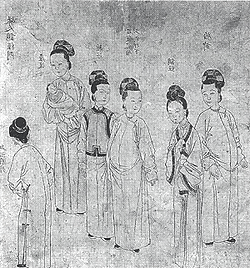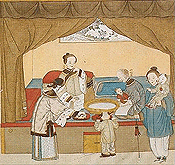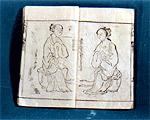Pathological Characteristics of Women from a TCM Viewpoint
Development of women's diseases are usually associated with a congenital deficiency, marriage at a very young age, multiple births, excessive sex, overstrain, an improper diet or injuries and infections. They lead to under-functioning in organs and/or irregular movements of qi (vital energy) and blood with damage to the extra meridians which result in different disease patterns.
 |
Classic illustration showing different kinds of women's conditions such as infertility, irregular menses and weakness after delivery. |
Menstruation, pregnancy, childbirth and lactation are unique to women. Blood is the elementary basis of these physiological functions hence there is the saying that "women take blood as primary." Due to the periodic loss of blood through menstruation, TCM believes that a woman is always in a state of blood insufficiency and is relatively excess qi (vital energy) inside the body. However, the blood and qi (vital energy) mutually generate and depend on each other that disharmony of the blood will affect the qi circulation, and, disharmony of qi will affect blood circulation. They have such a close relationship that the two cannot be separated pathologically.
In this way, disorders of blood and qi (vital energy) play important roles in women's pathology. Under normal circumstances, cold, heat and dampness evils tend to enter into the blood and affect its functioning. On the other hand, emotions like anger, pensiveness and fear tend to damage qi circulation, which in turn also influences the blood ultimately. See article on " The Six Evils and The Seven Emotions."
Specific women's diseases develop when there is direct or indirect damage to one of the four extra meridians: the Thoroughfare Vessel, Conception Vessel, Governor Vessel and Girdling Vessel. These extra meridians can be damaged by the evils or excess sexual activities directly, or in other cases, influenced by the disorders of qi, blood or organs indirectly.
Apart from pathogenic factors like cold, heat and dampness evils, many other factors induced by an improper lifestyle are influential. These factors affect the organs, blood and qi, disturb the normal function of the Conception and Thoroughfare Vessels and give rise to various gynecological and maternity diseases.
| 1. |
Constitutional factors |
Because of inherent differences or acquired conditions such as the environment, diet, nutrition, injuries and diseases our body constitutions vary. Our constitutional make- ups, such as under-development, weakness, predominance in yang deficiency or yin deficiency, predominance in spleen deficiency or kidney deficiency, being too fat or too slim make our body more vulnerable to certain kinds of pathogens. For example, an individual who is vulnerable to a spleen deficiency usually has problems with menstruation and fertility. On the other hand, a kidney deficiency body type may suffer from problems like miscarriage, abnormal fetal movement or infertility. |
| 2. |
Excessive sex and multiple pregnancies |
 |
This picture shows bathing a newborn after birth |
Excessive sex induces kidney damage, and, the exhausted body can develop diseases easily. During periods of menstruation, pregnancy and delivery, women should be especially cautious and abstain from sex so as to avoid the development of vaginal infections and miscarriage. In addition, women who have had multiple pregnancies or frequent deliveries (including miscarriage, abortion or induced abortion) may have caused serious damage in their blood and qi respectively. These lead to injuries in the Conception and Thoroughfare Vessels, which become the inducing factors for various gynecological diseases such as irregular menses, miscarriage or abortion. |
| 3. |
Imbalance between rest and physical activity |
| During periods of menstruation, pregnancy, delivery and breastfeeding, women should pay attention to integrating proper rest and physical activity. On one hand, it is unhealthy to stay inert and not exercise at all because this leads to sluggish flow of blood and qi (vital energy) circulation. Conversely, women should not undertake extreme amounts of exercise or labor in extreme either; it exhausts the blood and qi (vital energy) and leads to instability in the meridians surrounding the uterus. Commonly seen problems associated with heavy exercise include excess menses, certain pregnancy problems like miscarriage, abnormal fetal movements and threatened abortions or development of a prolapsed uterus. |
| 4. |
Improper diet |
| The Chinese emphasize good eating habits. Over consumption of frozen and raw foods, foods with extreme natures, eating excessive amounts, eating at irregular times and eating too fast are considered unfavorable factors for health. For example, too much hot and pungent foods cause heat to accumulate in the Conception and Thoroughfare Vessels, which force the blood to go astray. Problems like an early menstrual cycle, heavy menses and miscarriage can develop. However, eating too much frozen and raw foods, especially during the periods of menstruation and pregnancy, can damage the spleen yang and cause cold to dwell in the blood and meridians. The Conception and Thoroughfare Vessels become affected and problems of dysmenorrhea (painful menses), menopause, irregular menses, abnormal vaginal discharge and abnormal fetal movements may develop. |
| 5. |
Accidents and injuries |
 |
The Waike Zhengzong (Orthodox External Medicine) showing some women's injuries. |
During periods of menstruation and pregnancy, accidents and injuries cause direct effects on the Governor, Conception, Thoroughfare and Girdling Vessels and damage their blood and qi supplies. This may lead to irregular menses, miscarriage or abortion. Impairments caused by surgeries such as uterine curettage also come under this category and can damage the blood and qi of the above mentioned vessels. |
| 6. |
Endogenous injuries caused by emotions |
| In TCM, emotions are considered to be some major internal causes of disease. Their pathological aspects are divided into seven emotions, which are joy, anger, anxiety, pensiveness, grief, fear and fright. Sudden, strong and long-term stimulation of emotional pathogens lead to disharmony in the body's yin yang balance, organs, blood and qi (vital energy). These emotions further affect the Conception and Thoroughfare Vessels and may result in gynecological and maternity diseases such as irregular menses, dysmenorrhea (painful menses) and miscarriage. The seven emotions exert their effects on various organs significantly. Anxiety and anger damage the liver, which then fails to regulate blood and qi flow. Pensiveness damages the spleen, which then loses its role in consolidating the blood. Excessive grief damages the lungs, which fail to rule qi (vital energy) and affect the blood circulation. These incidences always result in irregular menses, dysmenorrhea (painful menses) or heavy menses. However, fear and fright damage the kidneys, which make them lose their storing and consolidating functions and gives rise to instability in the Conception and Thoroughfare Vessels. If not properly taken care of, it will become very serious and lead to abnormal uterine bleeding and abortion in pregnant women. |
|